Comfort Hard/Soft Night Guard: Indications and Materials
Night guards are not a one-size-fits-all solution. Each type serves a different clinical purpose, with hard and soft night guards being among the most commonly prescribed. Among them, the Comfort Hard/Soft Night Guard offers a unique balance of comfort and protection, making it one of the most well-tolerated options for patients.
In the article below, we’ll explore the applications and key differences between each type of night guard, helping you determine the most appropriate solution for your patients.
What is a night guard?
A night guard is a dental appliance designed to cover the occlusal (biting) surfaces of the upper or lower teeth during sleep. It is primarily used to protect against excessive wear caused by bruxism (teeth grinding) and to manage symptoms associated with temporomandibular joint (TMJ) disorders. This appliance goes by several professional terms, including mouth guard, occlusal guard, bite splint, dental mouth guard, and nocturnal bite plate.
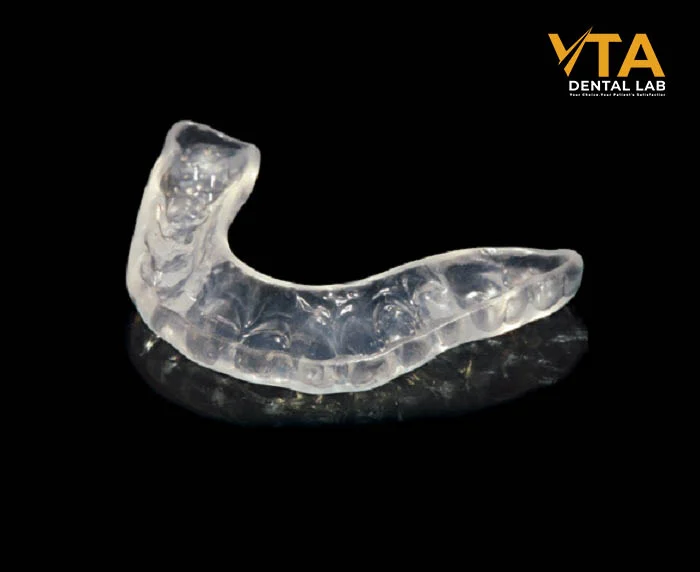
A dual-layer night guard fitted on an upper arch model, showing both the soft inner and hard outer layers
Choosing whether to prescribe an upper or lower night guard depends on each patient’s clinical situation, such as tooth anatomy, missing teeth, occlusal relationship, and overall comfort during use.
Night guards are fabricated from thermoplastics or acrylic-based materials. Commonly used materials include:
- Acrylic Resin: Durable and highly accurate, ideal for hard night guards
- BPA-Free Plastic: Ensures biocompatibility and eliminates exposure to bisphenol A
- Phthalate-Free Resins: Safer for patients concerned about hormonal disruption
- Ethylene-Vinyl Acetate (EVA): Soft, flexible material commonly used in soft guards
Depending on the fabrication process and material type, night guards can be categorized into soft, hard, or dual/comfort appliances.
Comfort Hard/Soft Night Guard treatments
Bruxism management
Bruxism is the involuntary grinding or clenching of teeth during sleep. This condition can lead to significant dental wear, jaw discomfort, and chronic headaches. Night guards are essential in preventing further damage. These appliances act as a protective barrier over the upper or lower arch, absorbing excessive occlusal forces and preventing excessive enamel erosion.
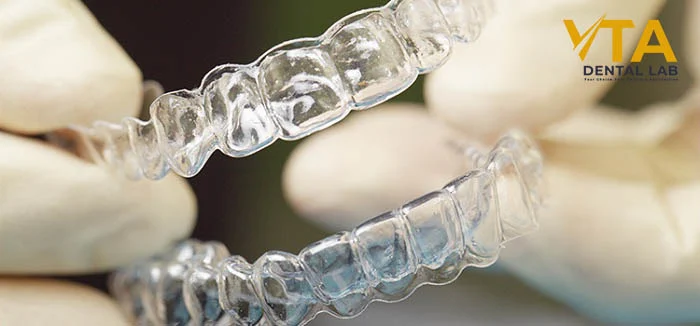
Side view of Comfort Hard/Soft Night Guard layers
Night guards can be fabricated from soft, hard, or comfort hard/soft night guard materials.
- In cases of mild bruxism or when the patient clenches without grinding, soft night guards are typically recommended. These appliances are thinner and more flexible, offering increased comfort during the adjustment phase.
- Conversely, hard night guards are better suited for patients with moderate to severe bruxism or significant jaw clenching. Clinical studies have demonstrated that hard splints are more effective in reducing masticatory muscle activity.
- Soft night guards, on the other hand, may unintentionally increase muscle activation, potentially reinforcing clenching behaviors in susceptible patients.
Proper appliance selection is critical for achieving therapeutic outcomes and ensuring long-term patient compliance.
Temporomandibular Joint (TMJ) Disorder Relief
TMJ disorders are multifactorial in origin, often triggered by bruxism, stress, or direct trauma to the jaw. Symptoms include jaw pain, limited range of motion, and discomfort in the surrounding facial muscles.
In such cases, a night guard serves to alleviate joint strain by promoting a more physiologic mandibular position. This occlusal decompression helps reduce pain and improve overall jaw function.
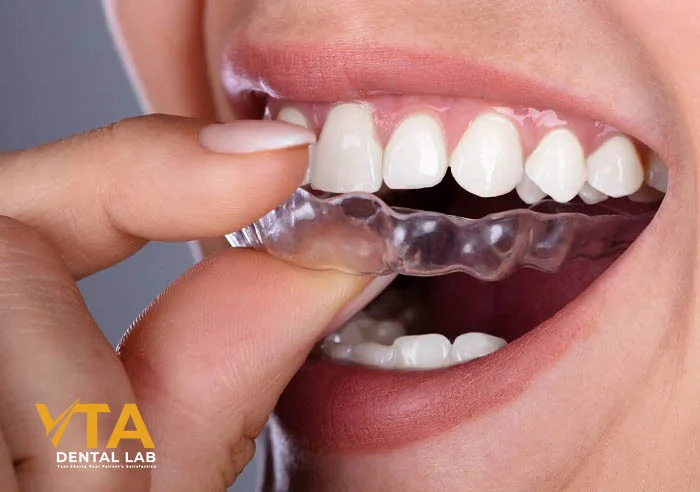
Patient holding soft night guard with gentle flexibility
Interestingly, several clinical evaluations suggest that soft night guards may provide quicker symptomatic relief in TMJ patients due to their cushioning effect and ease of adaptation. However, both soft and hard splints have demonstrated high effectiveness in improving TMJ-related symptoms, and the decision should be based on occlusal dynamics, severity, and patient-specific factors.
Hard night guard overview
Hard night guards are fabricated from rigid materials such as acrylic resin, copolyester, or other durable thermoplastics with comparable strength. These appliances are generally thicker than soft night guards, which enhances their structural integrity and allows them to withstand the significant occlusal forces generated by bruxism or clenching. Their design provides effective protection against dental wear and reduces the risk of developing or aggravating temporomandibular joint (TMJ) disorders.
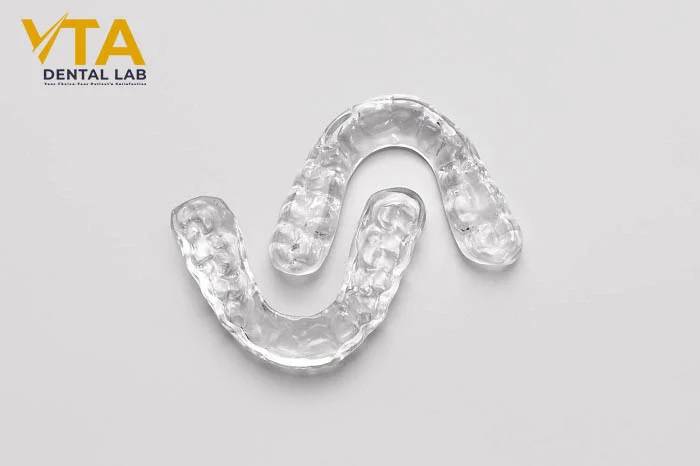
Custom hard night guard on dental cast
Hard guards are particularly recommended for patients who demonstrate moderate to severe bruxism, intense jaw clenching, or for those who are actively working to eliminate these habits during sleep.
Advantages of Hard Night Guards
- High durability: Ideal for patients with severe grinding, offering superior resistance to wear.
- Excellent protection: Effectively absorbs and distributes occlusal forces, preventing tooth damage.
- Longer lifespan: Hard night guards tend to last significantly longer than soft alternatives.
Disadvantages of Hard Night Guards
- Higher cost: Custom fabrication by a dental professional increases overall treatment cost.
- Initial discomfort: Some patients may find them bulky or difficult to adjust to during early use.
- Rigid structure: Less flexibility and more stiffness compared to soft or dual-laminate guards, which may reduce patient compliance in some cases.
Soft night guards overview
Soft night guards are fabricated from modified ethyl methacrylate, medical-grade silicone, or other flexible, elastic materials. These guards are designed to be thinner and more pliable than hard night guards, providing a more comfortable intraoral experience for patients, especially during the initial adaptation phase.
Soft guards are often preferred by patients with mild to moderate bruxism, those who prioritise comfort, or individuals with sensitive gums who may find rigid guards difficult to tolerate.
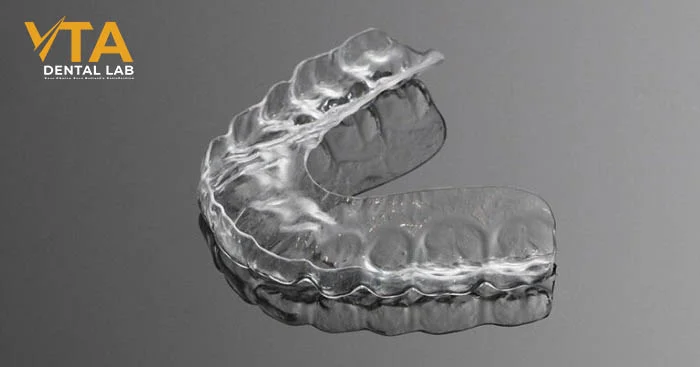
Soft night guard with smooth surface and clear finish
Advantages of Soft Night Guards
- Less bulky and more comfortable: Ideal for patients sensitive to intraoral appliances.
- Cost-effective: More affordable compared to custom hard guards.
- Easier adaptation: Flexible design accommodates the patient’s bite and oral habits with less resistance.
- Soft texture: Offers a more natural feel during wear, improving initial compliance.
Disadvantages of Soft Night Guards
- May encourage clenching or chewing: The soft texture can stimulate involuntary jaw activity, leading to faster wear.
- Shorter lifespan: Less durable, often requiring more frequent replacements due to material breakdown.
- Hygiene concerns: The porous nature of soft materials may retain moisture, making them more prone to staining, odour, and bacterial growth, necessitating regular and thorough cleaning.
Comfort Hard/Soft Night Guard: An alternative to both hard and soft night guards
Hard or soft night guards are commonly prescribed to manage bruxism. However, for patients who find traditional guards uncomfortable, VTA offers a more advanced solution: the Comfort Hard/Soft Night Guard (Dual-Layer Night Guard), combining durability with a high level of comfort.
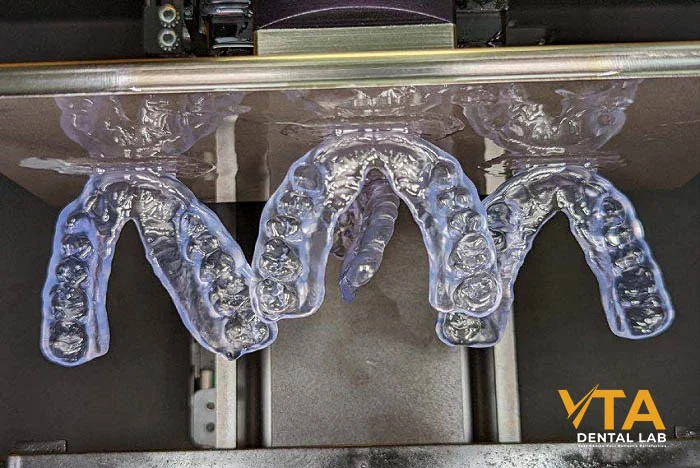
3D printed Comfort Hard/Soft Night Guard in a lab setting
Also known as a dual-layer night guard, this appliance is custom-made to protect teeth from grinding and clenching during sleep. It features a soft inner layer that cushions the teeth and gums for a snug, gentle fit, and a hard outer layer that provides strength and long-lasting protection against heavy occlusal forces.
Thanks to this combination, the Comfort Hard/Soft Night Guard offers both wearability and reliable defense. It’s an ideal choice for patients with moderate to heavy bruxism, or for those new to night guard therapy who may need a more adaptive and comfortable solution. While typically made for the upper arch, it can also be fabricated for the lower arch upon request.
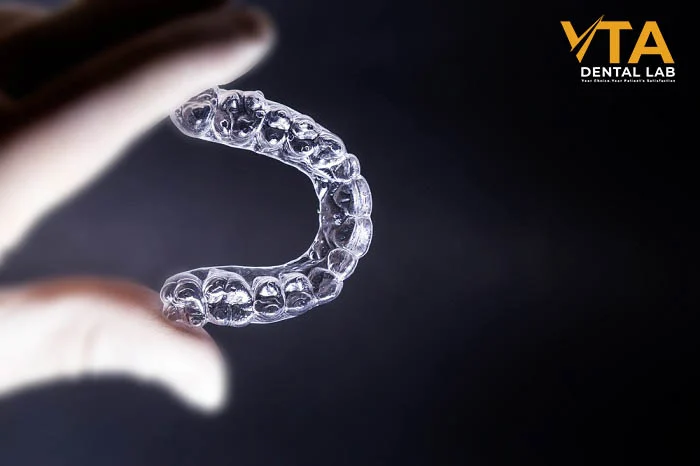
Night guard storage case with Comfort Hard/Soft Guard inside
3D Printed Comfort Hard/Soft Night Guard with VTA
Both hard and soft night guards serve specific roles in dental treatment, depending on each patient’s unique needs. At VTA, we use advanced 3D printing technology to ensure precise fit, consistent quality, and complete transparency in the materials used — ideal for patients who are concerned about chemical sensitivities.
If you’re looking for a trusted dental lab in the U.S. to consult on a specific case, our experienced technical team is always ready to support you with reliable solutions and responsive service.